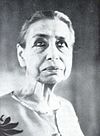Intermediate zone
In Sri Aurobindo's philosophy, the Intermediate zone refers to a dangerous and misleading transitional spiritual state between the ordinary consciousness and true spiritual realisation.[1]
Similar notions can be found in mystical literature, such as "the astral plane" and "the hall of illusion."
Aurobindo
Original use
The Intermediate Zone is first described in a letter to a disciple in the early 1930s. It was then published in 1933 in
Characteristics
Aurobindo asserted that spiritual aspirants may pass through an intermediate zone where experiences of force, inspiration, illumination, light, joy, expansion, power, and freedom from normal limits are possible. These can become associated with personal aspirations, ambitions, notions of spiritual fulfilment and yogic siddhi, and even be falsely interpreted as full spiritual realisation. One can pass through this zone, and the associated spiritual dangers, without harm by perceiving its real nature, and seeing through the misleading experiences. Those who go astray in it may end in a spiritual disaster, or may remain stuck there and adopt some half-truth as the whole truth, or become an instrument of lesser powers of these transitional planes. According to Aurobindo, this happens to many sadhaks and yogis.[1][5]
William Q. Judge - Astral intoxication
In his posthumously published book, Vernal Blooms, Theosophist
The dangers of astral intoxication or delusion are greatest for the person who revolves selfishly around himself. This may happen when one lacks the support and company of other sincere seekers. One
...must first dispel the inner darkness before trying to see into the darkness without; we must know ourselves before knowing things extraneous to ourselves.[3]
Paul Brunton
Paul Brunton included Sri Aurobindo's term of the "Intermediate Zone" as a name for a psychological and immature mystical level of delusion and subtle ego.[7]
Brunton uses several terms, such as astral plane, the intermediate zone, the hall of illusion. Once there, egoism becomes stimulated by the subtle forces they have evoked, the emotional nature becomes more sensitive and more fluid, the imaginative power becomes more active and is less restrained. If a person then falls victim to spiritual error regarding this state, the result is swollen vanity, superstitious credulity, emotions run riot, and wild imagination. Brunton considered this a major factor in explaining the human wreckage found on the spiritual path.[8]
See also
- Barzakh, the intermediate zone in Islam.
- Spiritual bypass
References
- ^ a b c Sri Aurobindo's Letters on Yoga - The Intermediate Zone
- ^ http://singingmountain.org/y2004jul15.html Paul Brunton on the Intermediate Zone - The Source of Psychic Delusion and the Subtle Ego
- ^ a b c "Vernal Blooms by W.Q.Judge". Archived from the original on 2007-10-11. Retrieved 2007-10-26.
- ^ Sri Aurobindo, Letters on Yoga, Part 3, Section 3 "Experiences of the Inner and the Cosmic Consciousness", Subsection 5, Pondicherry: Sri Aurobindo Ashram
- ^ a b Grey Lodge Occult Review :: Issue #9 :: The Intermediate Zone :: Archived 2007-10-12 at the Wayback Machine
- supermind. To reach supermind it is not enough to go above the ordinary movements of the human mind; it is not enough to receive a greater light, a greater power, a greater joy or to develop capacities of knowledge, sight, effective will that surpass the normal range of the human being. All light is not the light of the spirit, still less is all light the light of the supermind; the mind, the vital, the physical itself have lights of their own, as yet hidden, which can be very inspiring, exalting, informative, powerfully executive..." - for the date see "note on the text", pp.915-6
- ^ The Notebooks of Paul Brunton (Published in 1989; 16 volumes) - Volume 11: THE SENSITIVES - ch.12. THE INTERMEDIATE ZONE - online text at "Notebooks of Paul Brunton". Archived from the original on 2008-03-17. Retrieved 2008-04-25.
- ^ The Intermediate Zone – Notebooks of Paul Brunton Archived 2008-07-20 at the Wayback Machine
Sources
- Sri Aurobindo The Riddle of This World online
- ----- Letters on Yoga, Sri Aurobindo Ashram Press, Pondicherry (pp 1039–1046 of the third edition 1971).
- Sri Aurobindo The Synthesis of Yoga, fifth edition, Pondicherry: Sri Aurobindo Ashram, 1999, ISBN 81-7058-615-1 (hardcover) online
- Paul Brunton, Notebooks of Paul Brunton, 1989 online
- W. Q. Judge, Vernal Blooms, Canadian Theosophical Association, Bombay India, 1946 online

